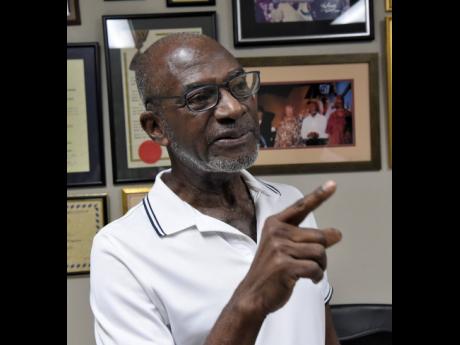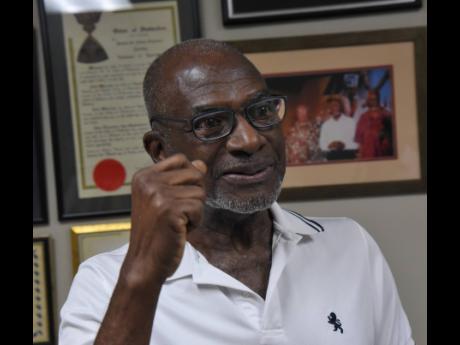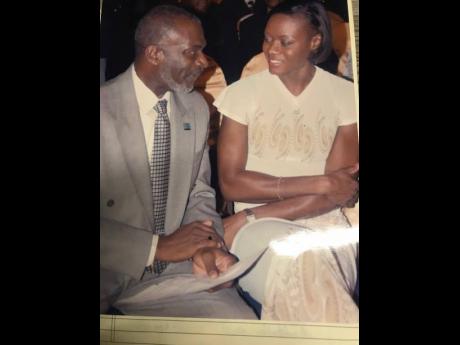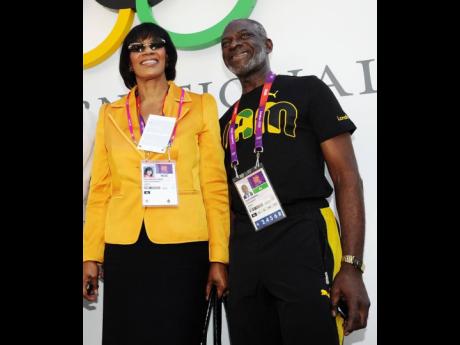POLL POSITION
Don Anderson talks politics, ethics, sports as he keeps finger on pulse of nation
The name Don Anderson is synonymous with political polling in Jamaica, the statistician having crafted a prolific career through Market Research Limited, a firm he bought in 1975 after working with the company for four years.
He first wet his feet in the profession after former Prime Minister the late Edward Seaga encouraged him to begin polling in 1988 after doing work for the then Jamaica Labour Party (JLP) leader.
Since then, Anderson has racked up an impressive list of clients, ranging from local businesses to regional political parties and even international organisations.
After nearly half a century, he is accustomed to being the darling when poll findings reflect what parties and their diehards want, and the pariah if the results are adverse.
In an interview with The Sunday Gleaner last week, the seasoned pollster said he does not interpret findings for his clients, but instead presents them with the raw data, noting that the accuracy of his polls over the years is his best marketing tool.
Anderson spoke of his strong personal bond with former People’s National Party (PNP) President and Prime Minister Portia Simpson Miller, noting that their paths crossed many times throughout her long political career, including during her time as sports minister, and his enduring association with sports. He recalled meeting Simpson Miller at various games or being part of delegations in which she was present.
But their relationship was tested after his prediction of a 32-28 seat victory for the Bruce Golding-led JLP in the 2007 general election.
The election result immortalised Anderson, and for about four months, Simpson Miller did not take his calls.
They eventually had a conversation after about six months had passed.
Despite his relationship with her, Anderson stressed that he could only present what the polls had unearthed.
Since then, there were three more general elections and Simpson Miller would return to power in 2011 before losing in 2016.
“The 2011 election was a no-brainer. The PNP was going to win that election comfortably and they did. In the 2016 election, the extent to which my professionalism stood out, I did an equal amount of polls for the PNP as well as the JLP. I did about 29 constituency polls for the PNP and the same number for the JLP. The difference between the two is to be noted. For the PNP – and Paul Burke was the principal client because he was the general secretary – I would present the data and they asked me to explain what it meant,” said Anderson.
The JLP polled in small tranches of five constituencies at a particular time, then another 10, and then national polls, said Anderson, adding that he had at least 10 different interactions with the then-retired Seaga on the poll findings in the 2016 general election cycle.
Market Research Limited is more than political opinion polls, however, which represents only five per cent of its business.
“There is no industry in this country that I have not done work on. You name it, and I can say what I did. And one of my principal clients is the World Bank. You don’t work for bodies like that if you are not credible and presenting reliable data. No sensible person would jeopardise 95 per cent of their business for five per cent of political work. No political party has been able to influence me in terms of the data that they (polls) have generated. None,” Anderson stressed.
Another staple that he is readily known for is the All-Media Surveys paid for by media houses to gauge influence and market share. With rising costs, the once annual reports are now produced biennially.
THE BOWL OF SOUP
The son of a dressmaker and a policeman, Don Anderson grew up in Portland.
He recalled the good country values inculcated in him and his seven siblings.
“I have never gone anywhere and glossed over findings to make anyone look good when the findings are opposite. That would be deception, unprofessional, everything you want to talk about. I have to live with myself,” he told The Sunday Gleaner.
The latest RJRGLEANER-commissioned polls done by his firm have shown massively underwhelming confidence levels in crime management and diminishing faith in the Jamaica Defence Force (JDF), which has consistently been the most respected institution in the country. Some critics have suggested that if more response choices were available, outcomes may have been different, but Anderson disagrees.
The man, who up to recently taught research methods in a graduate programme at The University of the West Indies (UWI), used the ‘bowl-of-soup’ method to explain whether the opinions of individuals who said they have never been polled matter.
“Let us say you have a bowl of vegetable soup. Somebody knocks on my door and says, ‘Mr Anderson, your soup is ready’. But I continue to work and the soup gets cold. They bring the soup to me, but if I don’t stir that soup, I won’t get a representative mix of what is in the soup. Everything settles.
“If, however, when the soup comes and I stir it properly and I take one spoonful, it will give me a representative taste of the rest of the soup. That is the best way to explain sampling,” Anderson said.
Two more spoonsful would confirm and reaffirm the taste.
The stirred soup – a metaphor for the population – shows that one does not need to engage every individual to know the general thoughts of the group. The important factor is ensuring the sample is representative of the population.
Social media’s influence
Cognisant of the growing influence of social media, Anderson said he now asks respondents where they get their information and how much they use social media.
“Social media is a big influencer. ... As pollsters we have to be very cognisant of social media and always reflect that because in terms of a political campaign, it can be the vehicle through which you get your messages to a large number of persons,” he stated.
But with much “multiplicity and duplicity in social media”, it was not clear who was being reached.
Nevertheless, the medium has the potential to reach a large group of people in a short space of time, he said.
He recalled being on a panel during a televised broadcast one election night, and some 20 youngsters were present.
“Of the 20 in there, 16 did not have a vote and of the other four, only two exercised it. But they were big social media influencers. They don’t vote, but they are noisy,” Anderson told The Sunday Gleaner.
Older persons were more willing to exercise their franchise, he noted, although a growing number were opting out.
Anderson expressed sadness that politics had become “transactional” as “individuals were willing to trade their votes for a benefit”. The business arrangement has removed “its ethical component, and there was less of a commitment to honour commitments to persons once they got into office”.
FOOTPRINT IN SPORTS
Don Anderson has been chef de mission for numerous Olympiads and other games. His involvement in sports goes back decades and as a youngster, it was either cricket, football, squash or hockey – or all four.
Anderson, who captained Titchfield High School’s 1965 Headley Cup-winning team, went on to play cricket, football and hockey while studying at The UWI.
His presidency of the Men’s Hockey Association made it an affiliate of the Jamaica Olympic Association (JOA), but he did not attend meetings.
He recalled being “set up” in a quest to remove a JOA first vice-president, and although that nomination and vote did not work out, he was successful in becoming second vice-president, forming part of the JOA administration in 1981.
Anderson believes he has been the “most decorated head of a Jamaican sports delegation”.
“In a well-constituted relationship between husband and wife, you have trouble much more when you have a team of 50 people, and I have had trouble,” he admitted. “My mantra in the chef de mission’s role is to do everything in my power to ensure that the right environment is created for the athletes to perform to the best of their ability.”
Anderson said the circumstances which led to last year’s Tokyo Olympics Men’s 110-metre hurdles champion Hansle Parchment almost missing his semi-final race were not unfamiliar. He recalled that in 1986 in Santa Domingo, he had to remove Camille Coates from a bus heading to the baseball stadium instead of the athletics stadium. When he enquired how the foul-up happened, the team manager said that they were all big people and they should know what to do.
He also recalled the embarrassment when athletes demonstrated against the inclusion of sprinting legend Merlene Ottey over Peta-Gaye Dowdie in the women’s 100m for the Sydney Games in 2000.
Anderson said “massive problems” at the 1996 Atlanta Games almost led to a fight in the village – but not among the athletes. There was also “more to the Gregory Haughton somersault in the men’s 4x400 relay”, he added.
On more than one occasion at various championships through the years, individuals were threatened with being placed on the next flight home.
Anderson dubbed the 2000 Sydney Games as the ‘disrupted games’, Athens 2004 as the ‘least organised’, and the 2008 Beijing Games the ‘best games’, comparable to London 2012.
Don Anderson is the father of four children. His daughter Karen is a 13-time Jamaica squash champion and a top rifle shooter.




